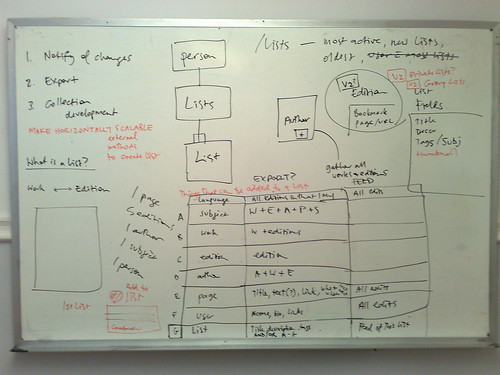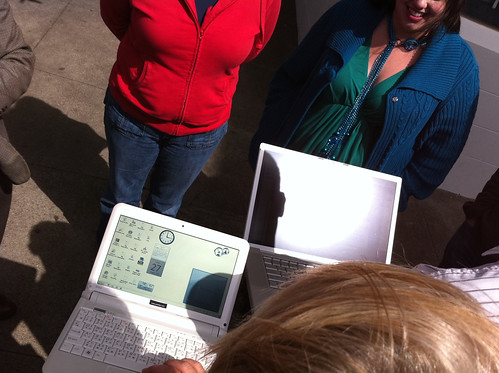Thanks again to Super Intern, Megan for creating this excellent screencast about merging authors on Open Library. It’s been a fantastically successful release so far, resulting in over 100,000 edits in the last 28 days! You can watch merges as they happen in the new Author Merges recent changes view. Thanks, Megan!
Tag Archives: Community
Lists are coming
This is a guest post from friend-of-Open-Library, Megan Amaral. She’s currently hurtling towards the end of a Master’s Degree in Library and Information Science at San Jose State University and has a self-proclaimed penchant for metadata systems. She’s joined the Open Library team as an intern for a month or two to observe and comment on what we’re up to. Welcome, Megan! She also tweets as @bookfinch.
The upcoming Lists feature will present a really exciting opportunity for Open Library users to create and share their handmade collections of Open Library records. Lists will be flexible enough to include pretty much everything: works, editions, authors, subjects, other lists, and potentially even specific pages of works held in the Internet Archive’s collection of scanned books.
I’m sure you already know that the Open Library catalog compiles data from different sources for its records, which can then be updated by users. This results in a truly a dynamic collection of information. With Lists, there will be another way for users to organize and interact with these records. To provide an overview, here are some of my thoughts on what Lists are in the context of the Open Library catalog.
- Lists are basic, unrestricted categorizations of things. The sky’s the limit.
- You don’t have to be an expert to create or understand them.
- They are tools for sharing and re-locating records.
- They are meaningful. If someone goes to the trouble to create a list, then there is at least one person that the list is important to.
I’m a personal supporter of user-created lists because they provide all of us with a new way of browsing and locating resources. As list creators, people can gather records that represent a personal idea in a sharable and retrievable format. As information seekers, lists allow people to benefit from the opinions of experts, fanatics, and your Aunt Lulu because when anyone can make a list, anyone can become the curator of collections of their choosing.
Once released, the Lists feature will allow people to assign tags to their lists. The lists that a book (or author) appears in will also be displayed directly on that book’s own page, which means that Open Library records and lists will intersect. For example, an initial search for Hemingway’s book The Sun Also Rises could take you to someone’s list of “Books by American Authors who Lived in Paris”…or a list of those actual authors…or a hybrid of both. You are bound to find something new and interesting!
Last week, I had the opportunity to participate in an early brainstorm for the Lists feature. During the brainstorm, George identified two activities that should definitely be included in the initial release of this feature. First, people should be notified in some way when the record of an item in their list is edited. Secondly, lists must be able to be exported. This second requirement launched a flurry of ideas of what, exactly, should be exported. The exciting photo below illustrates some of our thoughts.
The thinking is that in addition to the immediate items on the list, perhaps the export should go a little deeper into the catalog records. For example, if an author were included in a list (let’s call the list “Authors of Books About X-Rays”), would it be useful if the export of that list included the books that the author wrote? Or if a Work was listed, perhaps the different Editions of that work would be useful in the list export.
The discussion also included some thinking about how the Lists feature will actually fit into the Open Library website. What will the main Lists page have on it? Should it display lists that contain the most actively edited records here? Or the newest lists? And what will be on the pages of each individual list? (So far, these pages will include a history of edits made to the list, the Subjects of the items in the list, and an option to view changes made to the records of items in the list.)
I think that Lists will be an engaging feature for sharing and discovery. I’ll keep you updated about this feature as the Open Library team moves closer to its release!
Reading in the Sun!
We’ve just had a visit from Mary Lou and John from Pixel Qi, showing off their amazing new screens that can operate in two modes: with the backlight, like a normal LCD, or with the backlight off, like a highly reflective “epaper” display that uses an incredible 80% less power than a “standard” display.
Mary Lou is one of the founders of One Laptop Per Child (which Pixel Qi collaborates with these days), and the OLPC is one of the biggest distribution channels for Internet Archive books.
It's a Merge-Fest!
Thank you to everyone who’s merged an author or two since we launched the feature on Monday! The response has been excitingly wonderful – there have been about 200 merges run, with a record 31,246 edits for the last 7 days! And, not just by staff!
You can see all the merges as they happen from the new sub-section of Recent Changes:
http://openlibrary.org/recentchanges/merge-authors
I must say I was quite pleased to find Somerset Maugham in need of so much merge love. Check out all his alternate names! It’s so satisfying when you find a juicy one like that.
Onward!
Donate a book to the Book Drive!
 The Internet Archive is having an old-fashioned Book Drive to gather donations to supplement our digital book archive. If you post a book (or three) to the Internet Archive Book Drive, 300 Funston Ave, San Francisco, CA 94118, we’ll scan it and add it to the Archive. Thanks to existing foundation funding, we are also sponsoring the scanning of the first 10,000 books that are donated in this Book Drive. We are also seeking financial support to continue the scanning operations that the Internet Archive has been doing for some years now.
The Internet Archive is having an old-fashioned Book Drive to gather donations to supplement our digital book archive. If you post a book (or three) to the Internet Archive Book Drive, 300 Funston Ave, San Francisco, CA 94118, we’ll scan it and add it to the Archive. Thanks to existing foundation funding, we are also sponsoring the scanning of the first 10,000 books that are donated in this Book Drive. We are also seeking financial support to continue the scanning operations that the Internet Archive has been doing for some years now.


